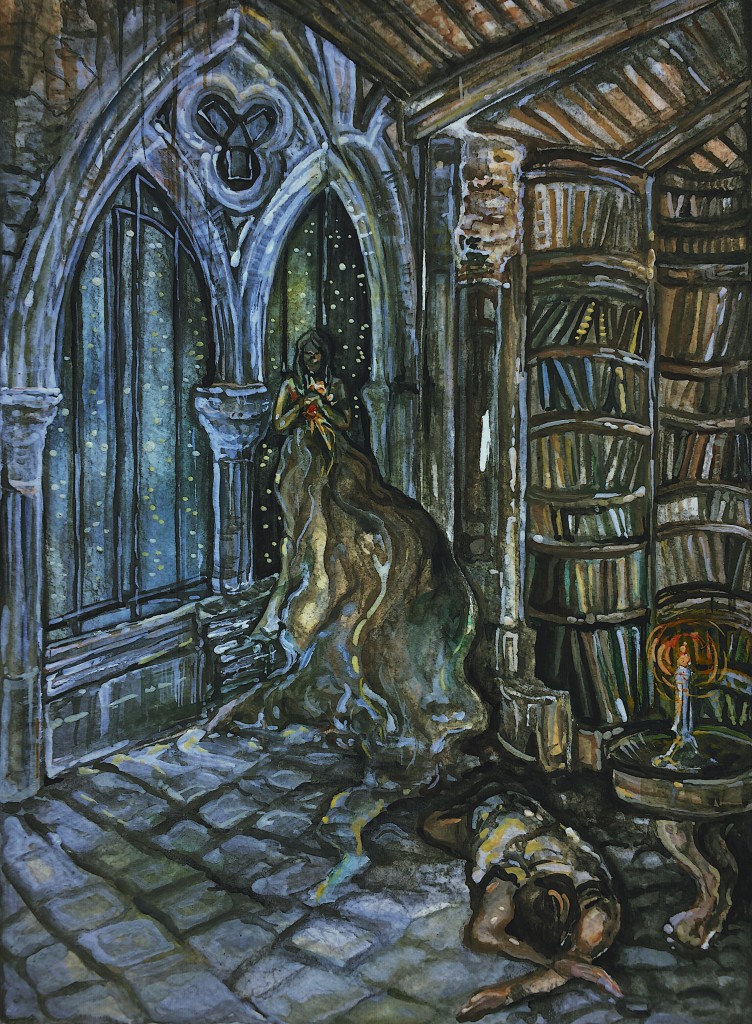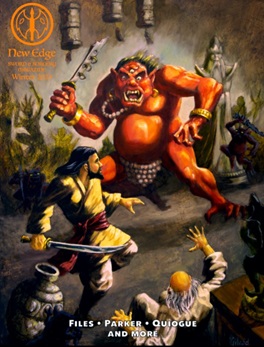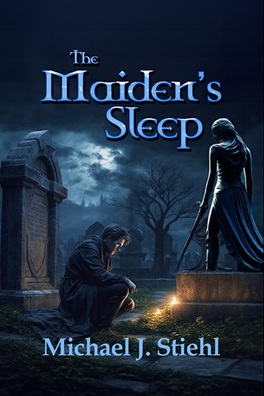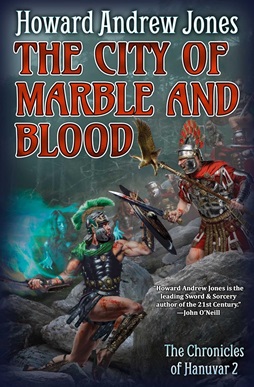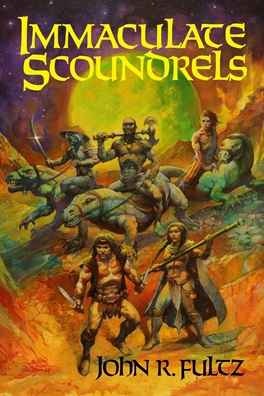A STONE’S THROW
A STONE’S THROW, by Howard Andrew Jones, with artwork by Karolína Wellartová, and audio by Karen Bovenmyer
Hanuvar pointed the sword at the assassin’s throat. “Lie down.”
Light from the swollen golden moon reached fitfully into the twisting alley, but there was no missing the curl of revulsion on the assassin’s lips as he eyed the stinking cobblestones. Apparently, he feared the smell more than death itself. Slim, mustached, and muscular, he wore the dark knee-length tunic typical of the common folk, though bereft of patches or stains. Here was a man who took pride in his appearance.
Hanuvar had dealt with Cericians before, and they were strangely proud and stubborn. They usually weren’t this foolish, though. “Down or die,” he growled.
At that, the fellow finally knelt, then lowered himself to the ground.
Hanuvar kicked aside the sword he’d forced from the man only moments before. Its clang was lost in the babble of voices and general clamor of the city’s festival under way this night in Cericia’s winding streets, twenty paces and a seeming world away.
He looked down at the fop who’d planned to kill him. “Who sent you?”
“I… I’m just a slit purse, trying to make–”
Hanuvar nudged him with a sandaled toe. “Speak truth before I’m bored. How did you recognize me?”
The prone would-be killer was silent for a heartbeat. An errant wind brought the enticing scent of roast lamb spiced with red injira root before being overwhelmed by the stench of offal and trash. When the man answered at last, he spoke softly and without pretense. “I was told exactly what you’d be wearing.”
The mid-summer air was cloying – it pressed the garish yellow shirt he wore against him like a second skin. Yet he knew a chill. He’d purchased the garments only yesterday, trimmed his hair himself in his room and left the inn through its kitchen door in the early morning. Who could possibly know what clothes he’d have on? Only a mage. But a mage with those sorts of resources would surely employ someone more capable than this man, wouldn’t he? “Who are you working for?”
“A wizard.”
“Does he have a name?”
“Arkif.”
That sounded like a Feydani. Odd that one of the oasis dwellers would be found in Cericia. But then the Dervan Empire had such a large price on Hanuvar’s head it probably lured takers from all corners of the world. “How many Dervani are with him?”
“What?” The fellow tried to look over his shoulder. “There’s no Dervani. He’s just an old wizard.”
Now that he thought about it, the man prone before him hadn’t seemed to act as if he was preparing to face Hanuvar Cabera, famed general and weapons master, and a reputed necromancer of such power some Dervani quaked now in dread at mention of his name. If his attacker had known who he was, surely he’d have attempted something more clever than luring him through an alley with the promise of dancing girls. Hanuvar had followed so he might learn just how pronounced the opposition was, but perhaps there was both more, and less, to the situation than he’d assumed. “Do you know who I am?”
“No.”
“Arkif didn’t tell you?”
“He just said that there was a fit, clean-shaven older man in a bright yellow tunica who’d be crossing through the market near the fish sellers at nine bells, and that I was to… waylay him.”
“What was to be done then?”
“Eh?”
The Dervan would prefer to catch him alive, but if that couldn’t be done, they’d surely like his head in proof, and it would naturally have to be preserved for identification purposes. “With my body.”
The answer was delayed in coming. “I didn’t have any instructions,” the fellow admitted at last. He turned his head on the cobblestones and tried to meet Hanuvar’s eyes, revealing a smudge of mud above his drooping mustache. “I’d have left it here. After I took your coins. Look, it was nothing personal.”
This time it seemed that the Dervani really might not be involved. So, who was, and why? “How close is this Arkif?”
“Very close. A stone’s throw.”
“All right. You can show me the way.”
“You won’t kill me, then, right?”
“Probably. Don’t get up yet.””
After another swift scan of the alley, Hanuvar crouched and thoroughly searched the man’s clothing. There were scuffed playing cards and coins, a pair of keys, a polished finger bone with the spiraling symbol of the goddess Corva, and about his neck, a plain silver necklace of fine make. He found a well-oiled and decorative sword sheathe, a middling dagger, a garrote, and a small throwing knife. He slipped the keys, gold, and jewelry into his belt pouch, then tossed everything else but the knife, which he stuck, sheathe and all, through his belt.
“What do I call you?”
“Mecrion.”
He put his own knife to Mecrion’s side and ordered him to walk in front. “You won’t lose me in the crowd. Don’t try it.”
Mecrion brushed feebly at his dirty sleeves and nodded before heading slowly out of the alley.
His course skirted the market’s edge, where hundreds, perhaps thousands, strolled among the lighted tents. Beneath the golden light of the full moon, costumed figures marched to the festival’s center in time with skirling pipes and tambours, torchlight tossing their lurching shadows on canvas walls. One heavyset woman wore an elaborately fashioned lobster mask and pincers, and her portly male companion had donned a fish-shaped hat. Judging by the applause and laughter there were even more clever costumes. It would have been nice, for once, to take in a few simple pleasures, even if he’d planned nothing more elaborate than sampling some of the famous Cerician mussels.
Mecrion stopped by a darkened two-story building beyond the far edge of the market square. A sign emblazoned with a sheep and a loom jutted out above its door. The assassin pointed a manicured finger at the building beside it. “That’s where he lives.”
The cylindrical tower threw only one weak square of light, from a long, open window in its fourth and highest floor. Vines grew thickly about its third story window.
“How do I get in?”
Mecrion glanced up at the window, then spoke softly as he rubbed the smudge on his cheek. “You have the key–I stole it from him. It’s the big one. I think it’s for the main door. You could also scale up to the window. Arkif’s a little deaf. The noise from the festival would drown you out anyway.”
“I think I see him,” said Hanuvar.
When Mecrion stared up at the window, Hanuvar hammered him in the back of the head with his knife pommel. He crumpled.
Hanuvar dragged the groaning man into the loomer’s doorway, then lifted the necklace to the moonlight. The thin strand of leather was threaded through tiny holes punched into the upper corners of a square of tarnished silver, engraved with a single curving rune. It smelled strongly of the scented soap Mecrion seemed to relish.
Any true mage’s main door would likely have a protective ward. Hanuvar was nearly certain he held its ward break. Mecrion had been issued a key, and had tried to trick him into opening the door without protection, or lure him to climb up through what were likely strangle vines. The fastidious little assassin was a weasel, and Hanuvar debated running him through before he simply stepped away, Mecrion’s necklace wrapped around his off hand, with which he lifted the key. Then, sword unsheathed, he unlocked the door and hurled it open.
Nothing happened, so he assumed the ward break had protected him. A dark room and vague suggestions of furniture loomed before him, but he paused only to scan for foes before sprinting up the stone steps to the right.
The stairs wound up between the tower’s outer and inner wall. Hanuvar raced past the dark doorways of the second landing, and the third, then slowed his pace for the remainder of his journey. Yellow light spilled feebly from the room at the tower’s height, and Hanuvar walked forward to meet it.
He entered a round chamber lined with shelves that brimmed with browned vials and dusty scrolls. An acrid smell lingered in the air. In the room’s center a battered round table supported a perfectly spherical ebon stone upon a ring of gold. Two red candles flanked it, glowing with golden light.
And at the window a skinny figure peered into the night. At the creak of a floorboard under Hanvuar, the stranger whirled.
Hanuvar advanced on him until his sword point hovered inches from his chest.
The olive-skinned man stared with open mouth. He looked more a beggar than a mage, for he wore a stained and rumpled brown tunic almost as long as a woman’s stola, and one of his sandal straps was half separated and stuck out from his ankle. His greasy hair, brown going to gray, hung past his shoulders. A white stone ring glinting on his right hand was his only article of finery.
“You,” said the man, his voice quavering. “How did you get past…” his voice trailed off as his eyes took in the necklace hanging from Hanuvar’s right hand.
“Keep your hands where I can see them.” Hanuvar stepped closer. “Arkif, isn’t it?”
“Don’t kill me.” The mage’s voice trembled. His clipped accent was unmistakably Feydani.
Hanuvar studied him curiously. He’d never seen him before. “What’s this all about? You really don’t know who I am, do you?”
“I know enough.”
“Such as?”
“That my stone predicted a man who looked like you would kill me, on this night. Long has your image haunted my dreams. I foresaw your arrival at the festival.”
“So you sent an assassin after me.”
Arkif nodded.
Hanuvar pondered his choices. “I had no intention of harming you until tonight, Arkif. I’ve never even heard of you before.”
The mage’s lips quivered. “Please,” he pleaded, “it was a mistake. I feared for my life. I pray you,” he continued, clasping his hands as though beseeching a goddess before her altar, “have pity.”
Arkif’s long fingers pressed in on his ring’s stone and an amber flash of light engulfed Hanuvar.
The general stumbled back into the table and collapsed, dropping with his sword to the stone floor. One of the candles plummeted impossibly slowly towards him. He saw Arkif reach behind him, smiling as he produced a small dagger. Its edge twinkled like hungry stars.
The candle finished its delayed descent and snuffed out next to his arm, spraying hot wax. The remaining candle, rocking on the unsteady table, sent wobbly shadows dancing across the room.
Hanuvar’s muscles had been reduced to leaden paralysis. Too late he realized his overconfidence. Just because Arkif was frightened and dressed like a beggar didn’t mean he was harmless.
He heard the mage gasp, the rumble of the stone rolling free on the table, and saw it plunge toward his head.
His right hand caught it. Startled, Hanuvar noticed groggily that his arm had moved with normal speed, then remembered the pendant still wrapped about his palm. Its magics must partly be protecting him
Arkif scuttled forward, stiffly clutching his dagger.
Hanuvar hurled the stone at his skull.
His accuracy had been honed by years of aim at both real and practice targets, but he was lying prone and using his off-hand. Even as the stone left his fingers, he knew it would pass over Arkif’s head by an arm’s length.
“No!” Arkif forgot his dagger and leapt for the stone. He snatched it from the air but landed off-balance on one foot and glanced back at the open window behind him. Regaining his balance with a shuffling step, he laughed with relief. Candlelight sparkled off the stone’s polished surface as he rolled it in his hands, inspecting it for damage.
Reaching still with his left hand Hanuvar closed on the hilt of the knife he’d stolen from Mecrion. The wizard wouldn’t stay diverted long, for there wasn’t that much stone to inspect. He snapped his wrist to send the sheath sliding clear, and the wizard looked up at the clatter, peering at him in the dim room. Hanuvar took two more heartbeats to gauge his aim. He had but one shot.
He flung.
The mage toppled backward through the window. Over the distant shouts of the crowd Hanuvar heard a dull thud.
The spell holding him failed on the instant. He climbed to his feet and snatched the rolling stone as he walked to the window. He’d meant to catch Arkif through the throat but was pleased enough with the result.
The mage’s body lay on the street, his limbs spread like a beached starfish.
Frowning, Hanuvar regarded the stone in his hand. Had it foreseen the destiny laid down by the gods for both of them? Or had it controlled the night’s events, guiding their courses like threads until they’d interwoven at this point? Or had the mage, fearing his death, seen one possible future and through his terror and elaborate scheming brought it so closely into focus that there had been no other possible outcome?
Hanuvar didn’t know. He let loose the stone, smiling grimly as it struck the road and shattered into a thousand fragments.
________________________________________
Howard lives in a tower beside the Sea of Monsters with a wicked and beautiful sorceress. When not spending time with her or their talented children he can be found hunched over his laptop, mumbling about flashing swords and doom-haunted towers. St. Martin’s published his newest fantasy novel, For the Killing of Kings, this February, and its sequel, Upon the Flight of the Queen, will be published in November. Paizo has published four of his Pathfinder novels and St. Martin’s/Thomas Dunne two of his critically acclaimed historical fantasy novels starring the Arabian sleuth and swordsman team of Dabir and Asim. He edits Tales From the Magician’s Skull. He knows karate, and wrote this bio thing in the third person while eating stale popcorn.
Karolína Wellartová is a Czech artist, painter creating images predominantly with the wildlife themes, nature studies and the literary characters. She’s inspired by the curious shapes and a materials from the nature, but the main source still comes from literature. Check out more of her work at her website.


